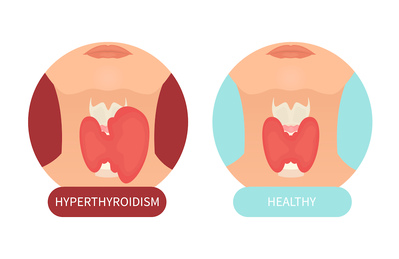Hyperthyroidism is a condition characterized by the overproduction of thyroid hormones by the thyroid gland. This excess production leads to an imbalance in the body’s metabolism, resulting in various symptoms and potential complications.
Causes of Hyperthyroidism
The most common cause of hyperthyroidism is Graves’ disease, an autoimmune disorder where the body’s immune system mistakenly attacks the thyroid gland, leading to its overactivity. Other causes include thyroid nodules or lumps, thyroiditis (inflammation of the thyroid gland), excessive iodine intake, and certain medications.
Diagnosis and Symptoms of Hyperthyroidism
Symptoms of hyperthyroidism can vary widely and may include:
- Rapid heartbeat
- Weight loss
- Increased appetite
- Anxiety
- Tremors
- Heat intolerance
- Fatigue
- Muscle weakness
- Changes in menstrual patterns
- Difficulty sleeping
Diagnosing hyperthyroidism typically involves a combination of physical examination, blood tests to measure levels of thyroid hormones (T3 and T4) and thyroid-stimulating hormone (TSH), as well as imaging tests such as ultrasound or thyroid scans.

Hyperthyroidism Treatment
Treatment options for hyperthyroidism aim to reduce the production of thyroid hormones and alleviate symptoms. These include:
- Medications: Anti-thyroid drugs such as methimazole or propylthiouracil can help inhibit the production of thyroid hormones.
- Radioactive iodine therapy: This treatment involves the ingestion of radioactive iodine, which selectively destroys thyroid cells, thereby reducing hormone production.
- Surgery: Thyroidectomy, or surgical removal of part or all of the thyroid gland, may be necessary in some cases, especially if there are nodules or tumors present.
The choice of treatment method depends on various factors including the underlying cause of hyperthyroidism, the severity of symptoms, and individual patient preferences.
Post-Treatment Care and Prevention of Hyperthyroidism
After treatment, it is essential to follow up with regular monitoring to ensure thyroid hormone levels remain within normal range. Patients may also require thyroid hormone replacement therapy if the thyroid gland is underactive following treatment.
To prevent hyperthyroidism, it’s essential to maintain a healthy lifestyle, avoid excessive iodine intake, and promptly address any underlying conditions such as autoimmune disorders or thyroid nodules. Regular thyroid check-ups are also recommended, especially for individuals with a family history of thyroid disorders or other risk factors.
Treatment of Thyroid Tumors with Radiofrequency Ablation (RFA): Effectiveness and Advantages
Hyperthyroidism is a common thyroid disorder that can significantly impact an individual’s quality of life if left untreated. If you suspect you may have symptoms of hyperthyroidism, such as unexplained weight loss, palpitations, or persistent fatigue, it’s crucial to consult with a healthcare professional for proper diagnosis and treatment.
In Vietnam, if you need assistance or consultation regarding hyperthyroidism, you can reach out to Dr. Pham Anh Tu, a renowned specialist in thyroid disorders. Don’t hesitate to seek medical advice or call the hotline if you have any concerns about your thyroid health. Taking proactive steps towards diagnosis and management can help alleviate symptoms and prevent potential complications associated with hyperthyroidism.
